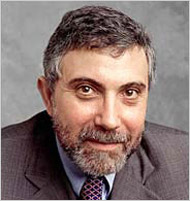 Paul Krugman opines that financial reform and regulation of the shadow banking system cannot wait:
Paul Krugman opines that financial reform and regulation of the shadow banking system cannot wait:
Paul Robin Krugman (pronounced /ˈkɹuːɡmən/; born February 28, 1953) is an American economist, columnist, author and intellectual.[2] He is a professor of economics and international affairs at Princeton University, and a columnist for The New York Times. In 2008, Krugman won the Nobel Memorial Prize in Economic Sciences "for his analysis of trade patterns and location of economic activity". Krugman is well-known in academia for his work in international economics, including trade theory, economic geography, and international finance.
Lest We Forget, by Paul Krugman, Commentary, NY Times: A few months ago I found myself at a meeting of economists and finance officials, discussing — what else? — the crisis. There was a lot of soul-searching going on. One senior policy maker asked, “Why didn’t we see this coming?”There was, of course, only one thing to say...: “What do you mean ‘we,’ white man?”
Seriously, though, the official had a point. Some people say that the current crisis is unprecedented, but ... there were plenty of precedents... Yet these precedents were ignored. And the story of how “we” failed to see this coming has a clear policy implication — namely, that financial market reform ... shouldn’t wait until the crisis is resolved. ...
Why did so many observers dismiss the obvious signs of a housing bubble, even though the 1990s dot-com bubble was fresh in our memories?
Why did so many people insist that our financial system was “resilient,” as Alan Greenspan put it, when in 1998 the collapse of a single hedge fund, Long-Term Capital Management, temporarily paralyzed credit markets around the world?
Why did almost everyone believe in the omnipotence of the Federal Reserve when its counterpart, the Bank of Japan, spent a decade trying and failing to jump-start a stalled economy?
One answer ... is that nobody likes a party pooper. While the housing bubble was still inflating, lenders[, investment banks, and money managers] were making lots of money... Who wanted to hear from dismal economists warning that the whole thing was, in effect, a giant Ponzi scheme?
There’s also another reason the economic policy establishment failed to see the current crisis coming. ... [T]he crisis of 1997-98... showed that the modern financial system, with its deregulated markets, highly leveraged players and global capital flows, was becoming dangerously fragile. But when the crisis abated, the order of the day was triumphalism, not soul-searching.
Time magazine famously named Mr. Greenspan, Robert Rubin and Lawrence Summers “The Committee to Save the World”... who “prevented a global meltdown.” In effect, everyone declared ... victory..., while forgetting to ask how we got so close to the brink in the first place.
In fact, both the crisis of 1997-98 and the bursting of the dot-com bubble probably had the perverse effect of making both investors and public officials more, not less, complacent. Because neither crisis quite lived up to our worst fears,... investors came to believe that Mr. Greenspan had the magical power to solve all problems — and so, one suspects, did Mr. Greenspan himself, who opposed ... prudential regulation of the financial system.
Now we’re in the midst of another crisis, the worst since the 1930s. For the moment, all eyes are on the immediate response to that crisis. ... And because we’re all so worried about the current crisis, it’s hard to focus on the longer-term issues — on reining in our out-of-control financial system, so as to prevent or at least limit the next crisis. Yet the experience of the last decade suggests that we should be ... regulating the “shadow banking system” at the heart of the current mess, sooner rather than later.
For once the economy is on the road to recovery, the wheeler-dealers will be making easy money again — and will lobby hard against anyone who tries to limit their bottom lines. Moreover, the success of recovery efforts will come to seem preordained, even though it wasn’t, and the urgency of action will be lost.
So here’s my plea: even though the incoming administration’s agenda is already very full, it should not put off financial reform. The time to start preventing the next crisis is now.











